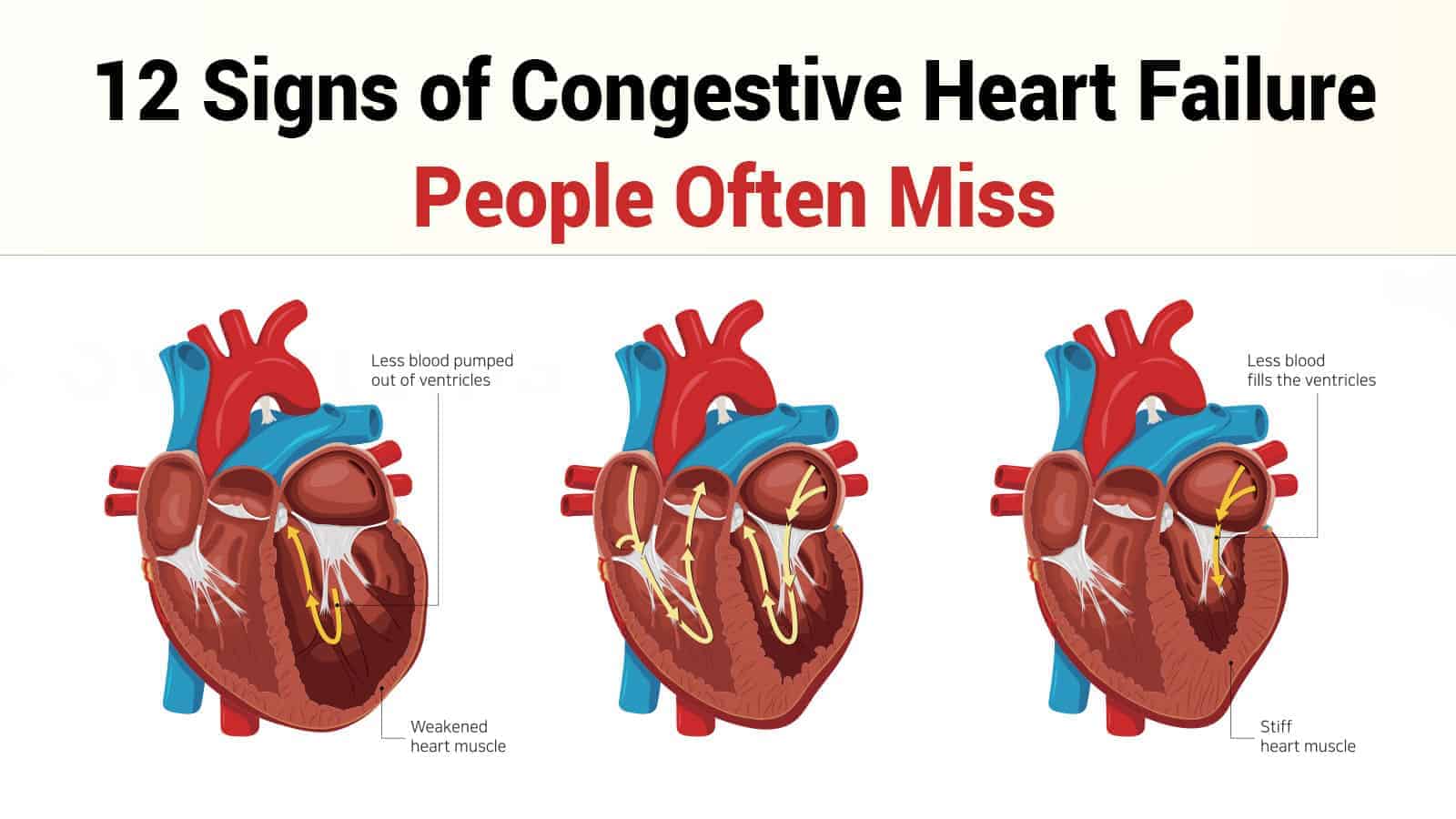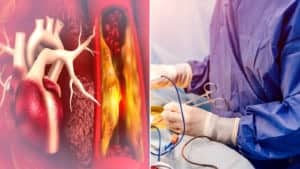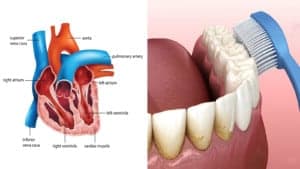Most people are unaware that congestive heart failure affects 5% of people older than 60 and 2% of people between the ages of 40 and 60; this condition can also affect children, teenagers, and young adults. It affects men and women at equal rates, and black Americans are at higher risk of developing the condition than white Americans, Asian-Americans, or Hispanic-Americans. Doctors in the United States diagnose an estimated half a million new cases of heart failure each year.
Individuals with heart failure often end up being hospitalized multiple times, and the five-year survival rate after diagnosis is less than 50%. People with heart failure are also prone to just suddenly dying; close to 300,000 people die from heart failure in the US every year.
Everyone knows the signs of an acute heart attack. Men usually experience severe pain in their chest along with cold sweating and dizziness, while women may or may not experience pain in their jaw, neck, arms, or upper back, along with severe sweating and dizziness. However, practically no one is aware of the signs and symptoms of heart failure. Here, we will discuss how to recognize the possible presence of heart failure.
What is congestive heart failure?
Congestive heart failure is a progressive condition in which the heart gradually becomes weaker and less capable of pumping blood. The word “congestive” refers to the fluid that builds up around the heart and in the lungs as a consequence of the weakening heart.
Early stages of heart failure can be treated through medication and lifestyle changes. However, if the condition is not diagnosed and treated early, it will progress to a stage that cannot be treated due to irreversible damage being inflicted on the heart.
Untreated high blood pressure and congenital heart valve defects can cause heart failure. It also links to high LDL cholesterol levels, diabetes, obesity, thyroid disease, certain kinds of infections, and severe allergic reactions.
Symptoms of congestive heart failure that people sometimes mistake for other conditions
1. Fatigue
Fatigue is usually the first symptom people in the early stages of heart failure experience. Unfortunately, fatigue is a very non-specific symptom associated with many other conditions. Some people with heart failure find they get tired more easily while performing activities that didn’t previously make them tired, while others generally feel fatigued all of the time.
A lot of people in the early stages of heart failure ascribe their fatigue to “getting older” or assume they are “coming down with something.”
2. Weird aches and pains
Heart failure rarely causes chest pain. Instead, weirdly enough, strange aches and pains may appear in odd places during mild exertion, such as climbing stairs. The jaw is a common location to experience heart failure pain. Other sites the pain can occur are the arms, the shoulders, the back, and even the abdomen. If you feel weird pains during exertion that subside once you’ve rested, you should consult a doctor.
3. Shortness of breath
People in the early stages of heart failure also tend to experience shortness of breath during mild exertion. Everyone will experience shortness of breath and heavy breathing during exercise, but people with heart failure experience shortness of breath in response to only mild exertion. Unfortunately, most individuals ascribe this symptom to being unfit.
If you are experiencing shortness of breath during mild exertion, please consult a doctor before embarking on an exercise program. Individuals with undiagnosed heart failure could have a sudden heart attack during exercise.
4. Swelling of the ankles and/or feet
The inefficient beating of the failing heart makes it difficult for the body to return fluid from the lower extremities to the rest of the body. This causes fluid to accumulate in the ankles and feet, especially after standing or walking for an extended time. This indicator is a very non-specific symptom since ankle swelling can be caused by a large number of common conditions, such as varicose veins, overeating salt, kidney disease, and certain medications.
5. Urinating more often
Another odd and non-specific symptom of early heart failure is needing to urinate more frequently, especially at night.
Unfortunately, this symptom also indicates aging in general (people older than 60 often experience the need to urinate during the night). But it can also stem from benign prostate hyperplasia or pregnancy/childbirth causing damage to the pelvic floor. Drinking alcohol or coffee before going to bed or just drinking too much water can also cause the symptom.
6. Irregular heartbeat
Many, but not all, people with heart failure will experience episodes where their heart seems to be beating oddly-too fast, or irregularly. Usually, heart palpitations like this are meaningless and are caused by anxiety, drinking too much coffee, and other commonplace situations. If you have these experiences fairly frequently while relaxing, it might be wise to consult a doctor.
7. Weight gain
Most people with heart failure find their weight gradually inching up on the scale. This is not a consequence of increased body fat. It is caused by fluid accumulating in the body, often in the abdomen. The abdomen may also appear to be gradually enlarging. Most people ascribe this symptom of getting older and/or overeating.
8. Lack of appetite
Another non-specific symptom associated with heart failure is a general lack of hunger or a reduced appetite. Lack of appetite is relatively common in the elderly, and it can also be associated with thyroid disease, kidney failure, and viral infections. It is quite common for people to experience a lack of appetite while fighting off a viral infection, and the lack of appetite can continue for up to a week after recovery from the disease. However, if you experience an ongoing lack of appetite coupled with weight gain (see #7), this is a sign that you need to consult a doctor.
9. A persistent, dry cough
Fluid accumulating in the lungs often triggers coughing that does not produce mucus. People with congestive heart failure tend to cough a lot. However, this is again a non-specific symptom since many things can trigger a dry cough, such as cold air, air pollution, allergies, asthma, a lingering respiratory infection, and lung cancer.
10. Blood in the mucus
Another odd non-specific sign of congestive heart failure is streaks of blood in mucus when the patient coughs. Blood in the mucus usually indicates a minor nose- or sinus-bleed caused by dry air. However, a failing heart can also cause this issue.
11. A bluish tint to the skin
As congestive heart failure worsens, the poor circulation and fluid accumulation in the lungs can make it difficult for the body to provide sufficient oxygen to the tissues. This symptom can cause the skin to appear pale or even mildly blue since well-oxygenated blood is bright red while poorly oxygenated blood is blue.
12. Fainting
Fainting isn’t a regular occurrence for most people, but in most cases, it is caused by standing up too quickly, which results in a sudden drop in blood pressure (orthostatic hypotension). Other causes include the following:
- Low blood sugar
- Dehydration
- Extreme fear that causes hyperventilation.
However, heart disease can also trigger fainting.
Diagnosis of Congestive Heart Failure
Heart specialists diagnose the condition a combination of a physical examination, listening to the heart through a stethoscope, an EEG, and a heart echocardiogram. The doctor will probably also order blood tests and possibly an exercise stress test and an MRI.
Treatment of Congestive Heart Failure
Cardiologists manage early-stage heart failure by treating an underlying cause, whatever that may be. For example, if the reason is a faulty heart valve, surgery to repair or replace the valve is necessary. If uncontrolled hypertension, medications cause it, and diet changes are the primary approach to treatment. Also, the doctor might prescribe medications to remove excess fluid from the body and regulate the heartbeat.
Unfortunately, final-stage heart failure is irreversible, typically. Therefore, doctors may only offer palliative care.
Final Thoughts on Catching the Signs of Congestive Heart Failure Early
Congestive heart failure stems from several different conditions. Fortunately, you can control many of these conditions, changes, like hypertension and diabetes, by improving your lifestyle. The primary approach to treating both of these conditions is dietary changes. A heart-friendly diet combined with medication and controlled exercise can keep hypertension and diabetes in check, preventing the associated heart failure from progressing.
It is crucial to diagnose heart failure as early as possible because the early-stage disease is treatable. Unfortunately, the signs and symptoms of early-stage disease are vague and non-specific. Unfortunately, doctors sometimes only diagnose congestive heart failure after trauma to this vital organ. Thus, if you notice you or a loved one has one or more of the symptoms listed in this article, seek medical care from your physician.



















